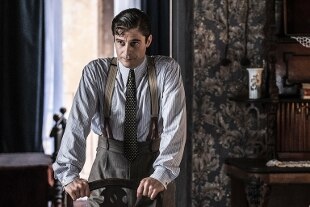Share
23 January 2021 Rai fiction continues to draw on the literary production of Maurizio de Giovanni.
After "I Bastardi di Pizzofalcone" and "Mina Settembre", "Il commissario Ricciardi" arrives on Raiuno (from Monday 25 January), a six-evening series directed by Alessandro D'Alatri and interpreted by Lino Guanciale.
Set in Naples in the early 1930s, the story tells the human and professional events of Luigi Alfredo Ricciardi, the 30-year-old commissioner of Mobile, who inherited from his mother the ability to see the ghost of people who died in a violent way and to listen to their last thoughts.
It is in this "gift" that the obsession with catching the killers on the one hand, and the renunciation of having a love life, on the one hand: "It is a characteristic that is useful in investigations but torments him as a man "explains Guanciale, who defines a" privilege "to have been able to play a character like Ricciardi.
"He is a man full of chiaroscuro, with a great sense of duty and a sensitivity out of the ordinary", says Guanciale.
Despite his resistances, women still knock on his existence: with the face of Enrica Colombo (Maria Vera Ratti), a young and shy teacher next door;
with that of Livia Lucani (Serena Iansiti), who attracts Ricciardi with her sensuality;
and also with that of Rosa Vaglio (Nunzia Schiano), the elderly nanny with whom the inspector shares his solitude.
"When I started the Ricciardi adventure I said it would be the most complex project of my career - says D'Alatri - I was right. I must, however, thank Commissioner Luigi Alfredo for showing me how important it is to never give up and that it would have been enough trust him and remain true to yourself in the face of adversity ".
Journey through the Naples of the 1930s
A journey through time in the Naples of the 1930s: this is also "Il Commissario Ricciardi".
From the Gambrinus café to the elegant Villa Pignatelli, the city between the two wars, with the dark atmosphere of the fascist era and the first signs of modernity, has been recreated in more than a year of shooting.
Thus we will enter with Luigi Alfredo Ricciardi in the Neapolitan Massimo, the San Carlo, at the Sannazaro theater and in the eighteenth-century Reggia di Portici.
You can admire the medieval monumental complex of the Annunziata, close to Forcella, with the Basilica, the Vanvitellian Succorpo and the courtyard.
Many scenes were shot between the seventeenth-century Church of San Ferdinando in Piazza Trieste e Trento, Palazzo Reale, the Gambrinus (currently closed, as it only happened during World War II, awaiting the tourist resumption) where the famous 'table' is located by Ricciardi;
and Piazza del Plebiscito with the Prefecture building.
At the Museum and Real Bosco di Capodimonte he also resumed in the courtyard of the school of ceramics, an Institute with a rare address "Caselli-De Sanctis".
From the neoclassical Villa Pignatelli to the Riviera di Chiaia, you will reach the sea of the Molo San Vincenzo.
The scenography of Via Toledo and part of the interior of the San Carlo were rebuilt at the former NATO base in Bagnoli.
There are also many locations outside the city: Monte di Procida with the beach of Acquamorta, Nocera Inferiore (Sa) with the former Bruno Tofano barracks, in the medieval "Borgo" district, built at the behest of Charles III of Bourbon in 1751. also made in the Casertano, in Capua and in Castel Volturno.
The other interpreters
"Il commissario Ricciardi" is produced by Rai Fiction and Clemart.
The cast also includes Antonio Milo (Brigadier Raffaele Maione), Enrico Ianniello (Doctor Bruno Modo), Adriano Falivene (Bambinella), Peppe Servillo (Don Pierino), Marco Palvetti (Falco), Fabrizia Sacchi (Lucia Maione) and Mario Pirrello ( Deputy Chief Garzo).
The fiction was shot in 28 weeks, in particular between Naples and Taranto, based on the novels of the writer who edited the screenplay together with Salvatore Basile, Viola Rispoli and Doriana Leondeff.
The series of twelve novels
De Giovanni's novels with Ricciardi are twelve: "The sense of pain", "The condemnation of blood", "Everyone's place", "The day of the dead", "By my hand", " Viper "," In the bottom of your heart "," Souls of glass "," Serenade without a name "," Swallows in winter "," The Angel's purgatory "and" The cry of dawn ", all from Einaudi.

